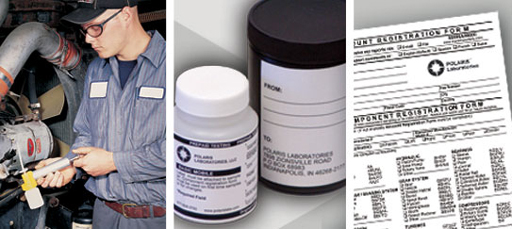
Oil is a vital component of your truck’s engine as it affects reliability, fuel consumption, efficiency, and your bottom line. Owner-operators can optimize engine performance and overall truck drivability by identifying performance problems in progress. Oil analysis can monitor both the engine and the fluid for wear and contamination and should be part of every owner-operator’s preventative maintenance (PM) routine.
As engine oil is pumped throughout different parts of the engine, it picks up vital trace elements of engine component wear and contamination. Oil analysis can monitor your diesel engine’s oil viscosity or thickness, its ability to neutralize acids, and its ability to disperse and suspend soot particles. The test results can reveal deficiencies before they become catastrophic.
There are two fuel conditions that could be found from the analysis:
- A “rich” condition. A rich condition is when there is too much fuel, usually caused by a faulty injector or fuel pressure regulator and improper air-to-fuel ratios. Testing the engine oil for fuel dilution can help in identifying this condition. Fuel contamination thins the oil and dilutes the oil's additives reducing the oil's film thickness and increasing the risk of metal-to-metal contact.
- A “lean” condition. A lean condition is evidence of a much higher concentration of air-to-fuel in the combustion chamber. Oil analysis will show increase in nitration (NOx). A change in the air intake system, Exhaust Gas Recirculation (EGR) operation and cooling system failures can influence this condition
Here are heat issues that could be found from the analysis:
- Heat expansion and the amount of heat rejection required of the Charge Air Coolers (CACs) in today's EGR engines causes significant levels of stress on an air cooler's aluminum components. Good connections between the turbo charger, CAC, and engine are critical for proper engine performance and fuel economy. A cracked CAC or leaking hose connection can result in a “rich” condition leading to excessive fuel consumption and/or loss of power.
- Engine temperature in excess of proper operating range will increase oxidation and nitration and deplete the engine oil's Total Base Number (TBN). Using oil analysis, these changes in oil condition can be identified in their earliest stages.
Oil analysis is an inexpensive diagnostic tool that will help you optimize drivability, improve reliability and save time and money. I recommend using POLARIS Laboratories to conduct your oil analysis.
 Want a free oil analysis and one-hour business consultation to review the results? Enter ATBS’ Driver of the Month Contest and each driver chosen will receive a free POLARIS Laboratories Oil/Fluid Analysis and a free one-hour business consultation with yours truly! Just tell them why you are a successful driver and you could be chosen.
Want a free oil analysis and one-hour business consultation to review the results? Enter ATBS’ Driver of the Month Contest and each driver chosen will receive a free POLARIS Laboratories Oil/Fluid Analysis and a free one-hour business consultation with yours truly! Just tell them why you are a successful driver and you could be chosen.